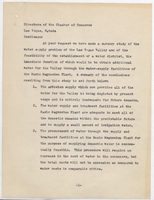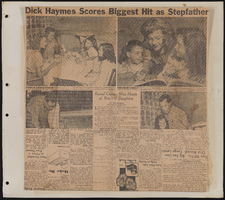Search the Special Collections and Archives Portal
Search Results
Lake-Eglington Family Photograph Collection
Identifier
Abstract
The Lake-Eglington Family Photograph Collection contains photographs of the Lake-Eglington Family in and around Las Vegas, Nevada from 1900 to 1976. The materials include photographs of early Las Vegas resident Olive Lake-Eglington and her family shortly after they moved to Las Vegas in 1904, as well as her eventual husband Earle Eglington after he moved to Las Vegas in 1911. The materials also include photographs of Native American artifacts, schools in Clark County, Nevada, artesian wells, the Hoover (Boulder) Dam, the Colorado River, Mt. Charleston, the Mormon Fort, the Stewart (Kiel) Ranch, the Las Vegas Ranch, and many early residents of Las Vegas.
Archival Collection
Archie C. Grant Photograph Collection
Identifier
Abstract
The Archie C. Grant Photograph Collection (1914-1968) contains black-and-white photographs of Nevada politician Archie C. Grant. The materials include photographs of Grant with the Las Vegas Housing Authority at groundbreaking ceremonies, the University of Nevada Board of Regents, and with other Nevada politicians. Materials also contain early photographs of the University of Nevada, Las Vegas campus, including the dedication of Maude Frazier Hall.
Archival Collection
Marjorie Barrick Museum of Natural History Records
Identifier
Abstract
The Marjorie Barrick Museum of Natural History Records (1939-2003) detail the creation of the Marjorie Barrick Museum of Natural History in Las Vegas, Nevada founded by Richard H. Brooks, a professor of anthropology at the University of Nevada, Las Vegas. The records are comprised primarily of correspondence between Brooks and members of the Southwestern Anthropological Association (SWAA), the Society for California Archaeology (SCA), and the meetings and exhibitions of the Nevada State Museum. The collection also contains financial statements that describe expenses for supplies, research, and excursions. Also included are anthropological, archaeological, and historical publications, as well as administrative files and Richard Brooks' correspondence with the Nevada Archaeological Survey (NAS). The collection also includes architectural floor plans for the Classroom and Physical Education, the original space that was converted into the museum in 1980, and plans for the redesign of the Barrick Museum and the Harry Reid Environmental Research Center addition.
Archival Collection
Stella Champo Iaconis oral history interviews
Identifier
Abstract
Oral history interview with Stella Champo Iaconis conducted by Kay Long on May 14, 1997, May 21, 1997, May 26, 1997, and September 22, 1997 for the Women's Research Institute of Nevada (WRIN) Las Vegas Women Oral History Project. Iaconis opens her interviews discussing her difficult upbringing and life on a ranch in Las Vegas, Nevada with her dad in the 1910s and 1920s. Iaconis then describes her experiences as a waitress in Las Vegas. As the interviews continue, Iaconis discusses Block 16 and sex work, the Helldorado Days, and life in 1930s Las Vegas. Iaconis ends the interview talking about her father and his career as a miner; her many husbands; and her personal history in Las Vegas.
Archival Collection

Anita Tijerina Revilla oral history interview: transcript
Date
Archival Collection
Description
Oral history interview with Anita Tijerina Revilla conducted by Marcela Rodriguez-Campo on October 09, 2018 for the Latinx Voices of Southern Nevada Oral History Project. In this interview, Revilla discusses her early life in San Antonio, Texas. She talks about her decision to make education a priority, figuring out the college application process on her own, and her initial interest in social justice. Revilla talks about how her critical consciousness was developed, and her pedagogical approach to teaching. Revilla describes her role in the 2006 May Day march, advocating advocating for the queer community, and disrupting oppressive systems to increase educational access for students. Lastly, Revilla discusses ethnic studies and the history of inequality in the United States.
Text
Sondra Cosgrove (Vote Nevada) oral history interview conducted by Magalena Martinez and Elia Del Carmen Solano-Patricio: transcript
Date
Archival Collection
Description
From the Lincy Institute "Perspectives from the COVID-19 Pandemic" Oral History Project (MS-01178) -- Community organization interviews file.
Text

Transcript of interview with Lorna Kesterson by James M. Greene, October 18, 1974
Date
Archival Collection
Description
On October 18, 1974, James M. Greene interviewed news editor, Lorna Kesterson (born December 30th, 1925 in St. George, Utah) in her office in Henderson, Nevada. The two discuss Kesterson’s work in news editing as well as her original reasons for moving to Nevada. They also discuss teenage social life of Boulder city, during the 1940s.
Text

Letter from Alfred J. Ryan to the Directors of the Las Vegas Chamber of Commerce, circa 1950
Date
Archival Collection
Description
Discussion of the feasibility of bringing water from Lake Mead to Las Vegas. Pittman is an older name for the city of Henderson. Whitney is an older name for East Las Vegas.
Text

Meeting minutes for Consolidated Student Senate University of Nevada, Las Vegas, February 24, 1997
Date
Archival Collection
Description
Text

